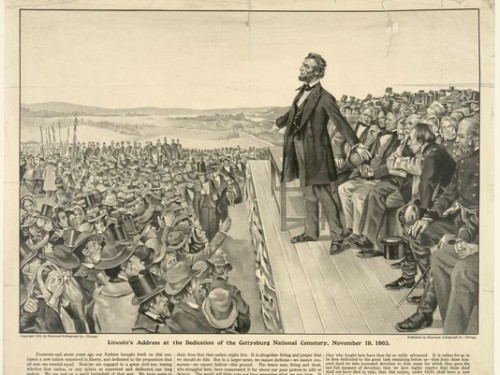
Library of Congress
One hundred fifty years ago today, President Abraham Lincoln stood before a crowd of ten to twenty thousand people, gathered in Gettysburg, Pennsylvania, where the bloodiest battle of the Civil War had raged the previous July. Fifty thousand had died.
Lincoln declared in his short speech (under 300 words):
“The world will little note, nor long remember what we say here.”
Yet today, a century and a half later, thousands are pondering his words, remembering his deeply moving consecration, his accurate commemoration of those that died on the Gettysburg battlefield: “The world can never forget what they did here.”
He spoke of America as a country “conceived in liberty dedicated to proposition that all men were created equal.” He eulogized the Union soldiers who died at Gettysburg, as having given the “last full measure of devotion,” to fight for a nation “conceived in liberty and dedicated to the proposition that all men are created equal.” He spoke for “a new birth of freedom,” a call to reassert his dedication to end slavery and for the equal treatment of those newly freed by the Emancipation Proclamation, passed earlier in that year.
Eighty years later, in 1943, America was embroiled in another war for equality, fighting to secure the freedom of those under the boot of Nazi and Japanese imperialism. We offered up our young men to give their “last full measure of devotion” to wage war against foes whose goal was to deny equality to all. Both the Nazis and the Japanese in World War II were certain of the superiority of their respective “races,” although the concept of an “Aryan race” has no basis in reality. In World War II, both the Nazis and the Japanese were able to condone their brutal death camps as necessary to rid the world of “inferior people.”
Today we honor the memory of the Gettysburg Address, delivered 150 years ago, and Lincoln’s great prowess in capturing in so few words, the essence of what those 50,000 deaths at the Battle Gettysburg meant to our nation.
I am also remembering the battles being fought eighty years after his address, in World War II, to secure freedom and liberty for all. It’s a reminder that the fight for freedom is never really finished.